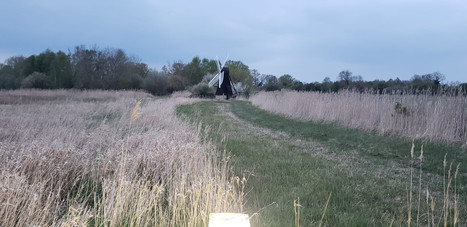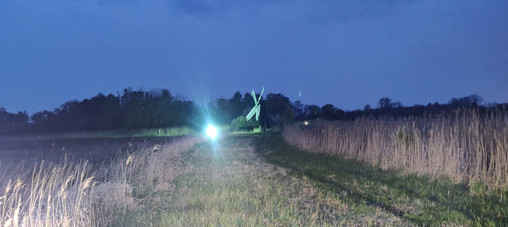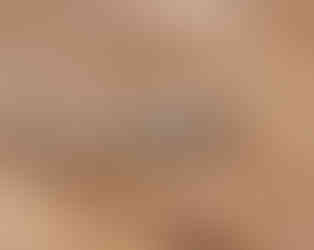An Illuminating night at Wicken Fen
- Stephen Thompson
- May 12, 2023
- 3 min read
Updated: Jul 18, 2023
You could be forgiven for thinking the Blackpool illuminations had come to Wicken Fen on 30th April but It was in fact Fourteen light traps we had out. We wanted to maximise our chances of catching a reasonable amount of moths as mothing recently had been pretty slow surely Wicken would not disappoint?? Read on to find out:
Present on the night were myself, Ben Sale, Steve Green, Mark Ward, Lois Clarke, Seb Buckton and Ian Leach (on his moffy travels from Scotland) We met by the visitor centre at around 7.30 and immediately questions were being asked as to whether we would actually catch many moths? We took a walk and decided where we would put the traps and how many we would have out. Ian decided to put all 7 of his out, Seb had 2, Ben had 2, myself, Steve Green and Mark had 1 each making 14 traps. None of us had ever trapped here at this time of year before and in the few years I had been trapping here 14 is double the number of traps we have had out previously. Check the map below for roughly the locations of the traps. There were a mixture of MV and Actinic.

Once we had set up it was just a bit of a waiting game until it got dark and the Moths started to appear.
The first moth to my trap and several others was a small micro called Elachista rufocinerea but the first moth record of the visit didn't actually involve a light trap and was seen earlier in the day. Ian bought along an Emperor Pheromone lure which was successful and attracted 2 males, 1 is pictured below:

Below is just a small selection of moths from the night:
photos from top left to right: Scrobipalpa acuminatella (possible, retained for dissection), Elachista maculicerusella, Elachista apicipunctella, Ancylis apicella, Parornix angelicella (possible, retained for dissection)
Micros above courtesy of Ben Sale.
Lesser Swallow Prominent, Pale Prominent, Angle Shades, Nut Tree Tussock, Chinese Character and Streamer.
Photos above courtesy of Lois Clarke
There were just a couple of non-moffy species that were found near the lights, A common Groundhopper and a male Glowworm. Photos below:
One of the best moths of the night was a micro called Ancylis palludana, a scarce species occurring in a few wetland localities such as Wicken Fen. It was caught in Seb and Ian's traps.

Photo above courtesy of Seb Bucton:
The weather was pretty kind to us on the night considering what the forecast had been. The rain held off long enough to get around 4hrs trapping in and only started as we were packing up around 00.15. Myself, Ian and Kate were staying overnight so they left some of their traps out and collected them in the morning. Several coffees during the next few hours kept us awake for an event starting at 9am talking to members of the public and showing them some of the moths we caught. It was well attended and it was especially good to see kids taking an interest.
A few more photos below from the mornings Moffy event:
Photos above from the top, Chocolate Tip, Puss Moth, Pinion Spotted Pug and Puss Moth with an Emperor.
In total we caught and identified 68 species which was much better than I thought it would be, Wicken certainly did not disappoint.
Below is a complete list of what moths we recorded:
WICKEN FEN MOTH LIST 30TH APRIL 2023
MACROS MICROS
Angle Shades Agonopterix alstomeriana
Brimstone Agonopterix yeatiana
Brindled Beauty Ancylis apicella
Brindled Pug Ancylis paludana
Chinese Character Agonopterix arenella
Chocolate-tip Agonopterix heracliana
Clouded Border Agonopterix ocellana
Clouded Drab Cochylis atricapitana
Common Carpet Dyseriocrania subpurpurella
Common Pug Elachista apicipunctella
Common Quaker Elachista maculicerusella
Common Wave Elachista rufocinerea
Dark Barred Twin Spot Carpet Emmelina monodactyla
Double Striped Pug Endrosis sarcitrella
Early Tooth-striped Mompha epilobiella
Emperor Moth Phyllonorycter quercifoliella
Flame Shoulder Platyedra subcinerea
Flame Wainscot Pseudoswammerdamia combinella
Garden Carpet Semiscopis steinkelleriana
Hebrew Character Parornix sp retained for disection prob anglicella
Iron Prominent Scrobipalpa sp retained for disection prob acuminatella
Least Black Arches
Lesser Swallow Prominent
Muslin Moth
Nut Tree Tussock
Oak Tree Pug
Pale Prominent
Pale Tussock
Pebble Prominent
Pinion Spotted Pug
Powdered Quaker
Purple Thorn
Puss Moth
Red Chestnut
Red-green Carpet
Red Twin Soot Carpet
Reed Dagger
Sallow Kitten
Shoulder Stripe
Shuttle Shaped Dart
Streamer
Swallow Prominent
Twenty Plumed Moth
V-pug
Water Carpet
Waved Umber
White Ermine
Watch out for another moffy blog coming soon on our next visit to Wicken at the end of May.

















































Comments